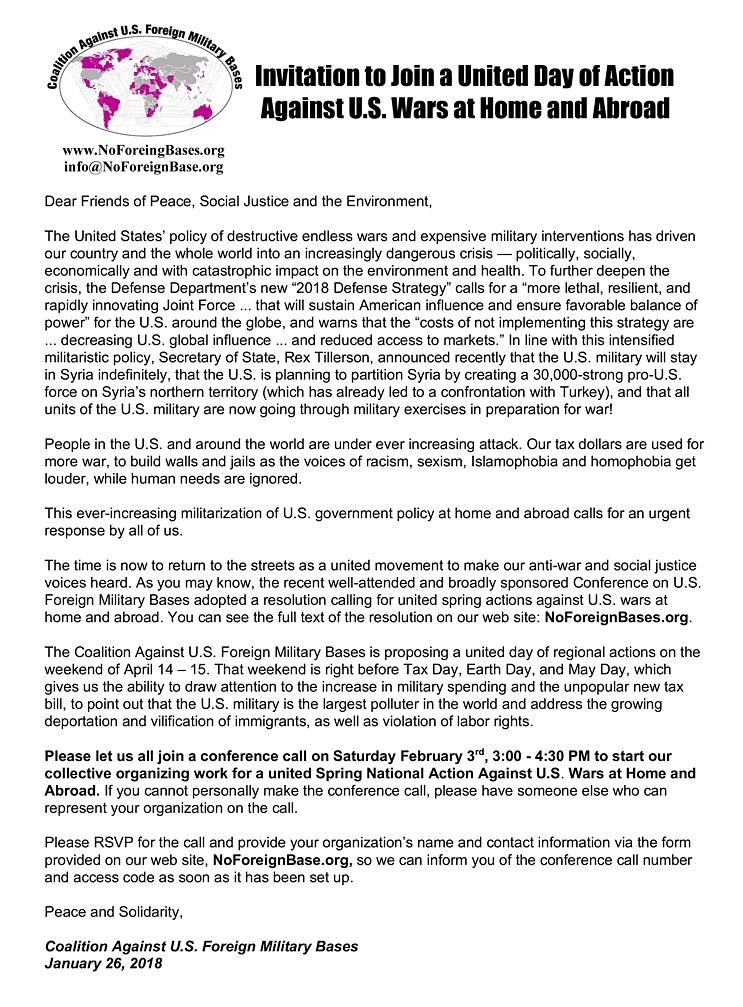October 1, 2018—The Black Alliance for Peace (BAP) has launched U.S. Out of Africa!: Shut Down AFRICOM, a campaign designed to end the U.S. invasion and occupation of Africa.
Today marks the 10th anniversary of the establishment of AFRICOM, short for U.S. Africa Command. Although U.S. leaders say AFRICOM is “fighting terrorism” on the continent, we believe geopolitical competition with China is the real reason behind AFRICOM’s existence. AFRICOM is a dangerous structure that has only increased militarism.
When AFRICOM was established in the months before Barack Obama assumed office as the first Black President of the United States, a majority of African nations—led by the Pan-Africanist government of Libya—rejected AFRICOM, forcing the new command to instead work out of Europe. But with the U.S. and NATO attack on Libya that led to the destruction of that country and the murder of its leader Muammar Gaddafi in 2011, corrupt African leaders began to allow AFRICOM forces to operate in their countries and establish military-to-military relations with the United States. Today, those efforts have resulted in 46 various forms of U.S. bases as well as military-to-military relations between 53 out of the 54 African countries and the United States. U.S. Special Forces troops now operate in more than a dozen African nations.
Vice Admiral Robert Moeller, first and former deputy of AFRICOM, declared in 2008, “Protecting the free flow of natural resources from Africa to the global market is one of AFRICOM’s guiding principles.”
We say AFRICOM is the flip side of the domestic war being waged by the same repressive state structure against Black and poor people in the United States. In the U.S. Out of Africa!: Shut Down AFRICOM campaign, we link police violence and the domestic war waged on Black people to U.S. interventionism and militarism abroad.
"Not only does there need to be a mass movement in the U.S. to shut down AFRICOM, this mass movement needs to become inseparably bound with the movement that has swept this country to end murderous police brutality against Black and Brown people,” says Netfa Freeman, of Pan-African Community Action (PACA) and the Institute for Policy Studies (IPS). Freeman represents PACA, a BAP member organization, on BAP’s Coordinating Committee. “The whole world must begin to see AFRICOM and the militarization of police departments as counterparts."
It costs $267 million to fund AFRICOM in 2018, according to Vanessa Beck, BAP research team lead and Coordinating Committee member.
“That money is stolen from Africans/Black people in the U.S. to terrorize and steal resources from our sisters and brothers on the African continent,” Beck said. “Instead, that money should be put toward meeting our human needs in the U.S. and toward reparations for people in every African nation affected by U.S. imperialism.”
BAP makes the following demands:
the complete withdrawal of U.S. forces from Africa,
the demilitarization of the African continent,
the closure of U.S. bases throughout the world, and
the Congressional Black Caucus (CBC) must oppose AFRICOM and conduct hearings on AFRICOM’s impact on the African continent.
We ask the public to join us in demanding an end to the U.S. invasion and occupation of the continent of our ancestors by signing this petition that we will deliver to CBC leaders.
This campaign is BAP’s effort to help shut down all U.S. foreign military bases as well as NATO bases. BAP is a founding member of the Coalition Against U.S Foreign Military Bases.
Visit blackallianceforpeace.com/USoutofAfrica for resources.
---
Media Contact: info@blackallianceforpeace.com

















